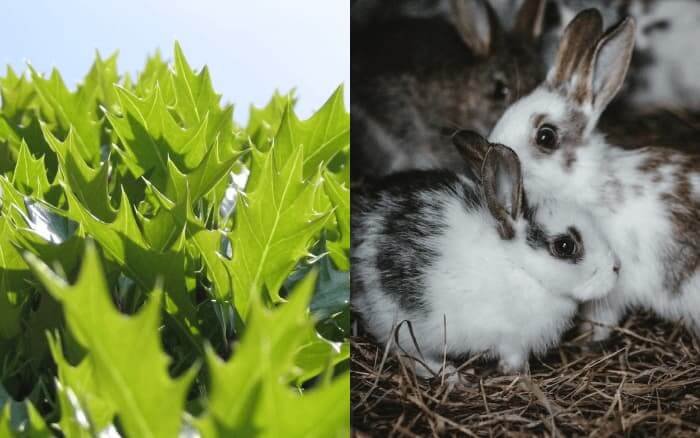Rabbits are popular pets known for their adorable appearance and playful personalities. As with any pet, it is essential to provide them with a diet that is well-rounded, nutritious, and safe. When it comes to a rabbit’s diet, one of the key things to consider is the types of vegetables and greens that they can eat. Mizuna is a type of Japanese mustard green that is becoming increasingly popular as a rabbit food. But can rabbits eat Mizuna safely?
In this article, we will explore the question ‘Can rabbits eat Mizuna?’ and provide information about the potential benefits and risks of feeding Mizuna to rabbits, as well as tips for safely incorporating Mizuna into your rabbit’s diet.
Can Rabbits Eat Mizuna?
Yes, rabbits can eat Mizuna. Mizuna can be a tasty and nourishing treat for your rabbit. Vitamins, calcium, and other nutrients present in Mizuna can certainly be helpful for a rabbit’s health. It can promote your rabbit’s general health and assist in strengthening its immune system.
However, Mizuna should only be given to your rabbit as an occasional treat as a part of a healthy diet. It shouldn’t be your rabbit’s primary source of nutrition. You should give your rabbit a well-balanced meal that includes protein, fats, carbohydrates, and other important vitamins and minerals.
The Nutritional Benefits of Mizuna for Rabbits
Mizuna is rich in nutrients that can be beneficial for rabbits. It is a good source of Calcium, and iron and contains vitamins like A, C, and K. High vitamin A can be helpful for a strong immune system in rabbits. Antioxidants present in Mizuna can be useful for rabbit cells that are damaged by free radicals.
It is also low in calories and high in antioxidants and vitamins could be very beneficial for the overall health of rabbits.
How to Safely Prepare Mizuna for Your Rabbit
Whilst mizuna can be healthy and nutritious food for your rabbit, there are some safety precautions that you can take when safely preparing mizuna for your rabbit. You can follow the following steps to safely prepare Mizuna for your rabbits:
- Thoroughly wash the Mizuna to remove any dirt or pesticides.
- Cut it into small and bite-sized pieces.
- Offer Mizuna pieces as a treat and carefully monitor your rabbit to ensure they are chewing and swallowing safely.
Please ensure that rabbits are always given Mizuna in small quantities. Feeding Mizuna in large quantities could be harmful to rabbits. When giving mizuna as a treat to your rabbit, please keep an eye on any sign of discomfort.
The Potential Risks of Feeding Mizuna to Your Rabbits
Whilst mizuna can be given to your rabbit, one should always be careful about the potential risks of feeding Mizuna. No rabbits are the same and each rabbit might react differently when given Mizuna. There are some potential risks to be aware of when feeding Mizuna to your rabbits.
Mizuna contains calcium oxalate which could cause issues with the kidney. If taken in larger quantities, it could cause kidney and bladder stones. However, when taken in smaller quantities, there are minimum risks of feeding mizuna to your rabbit.
Always be mindful of your rabbit’s condition when feeding mizuna to your rabbit. Whilst a rabbit can undoubtedly enjoy it as a treat but always seek advice from your veterinarian for the sake of your rabbit’s health. If you notice any unusual symptoms after your rabbit eats Mizuna, immediately take your rabbit to the nearest veterinarian.
How to Incorporate Mizuna into Your Rabbit’s Diet
Once you have decided to include Mizuna into your rabbit’s diet, start with smaller quantities by following the safety preparation mentioned above. You can monitor your rabbit’s reactions whilst gradually increasing the amount over time. If your rabbit is showing any sign of discomfort or negative symptoms then you should immediately stop feeding any further.
It is also important to remember that mizuna should only be given to your rabbit in moderation. While it can be a healthy and tasty treat for rabbits, it is not a substitute for a well-balanced diet.
Alternatives to Mizuna for Rabbits
If you’re concerned about introducing mizuna, plenty of other rabbit-safe greens offer similar nutritional benefits:
- Romaine lettuce: High in water and fiber, perfect for hydration and digestion.
- Endive: Crunchy and low in calories, a great choice for weight management.
- Cilantro: Rich in vitamins and antioxidants, adds a touch of flavor to your rabbit’s diet.
- Basil: Aromatic and packed with nutrients, a delicious occasional treat.
Fruit options for rabbits include bananas, apples, cabbage, and kale. These fruits are also rich in vitamins and minerals and can be a tasty and healthy treat for your rabbit.
Additionaly there are various other fruits, and vegetables that can be safely given to your rabbits.
Conclusion
In conclusion, rabbits can safely eat Mizuna as a treat. Nutrition and vitamins found in Mizuna can be highly beneficial for your rabbits. It is highly recommended to consult with your veterinarian before making any new changes to your rabbit’s diet. They can help you to make sure your rabbit is eating a balanced diet by offering you individualized nutrition advice based on their unique needs.
By following these guidelines, you can safely share apples and other healthy treats with your rabbit and support their overall health and well-being.
Frequently Asked Questions
Can Rabbits Eat Mizuna Daily?
Yes, rabbits can eat Mizuna daily but in small quantities. Feeding your rabbits in large quantities might affect their overall health.
Can You Feed Mizuna Raw?
Yes, it is perfectly fine to feed Mizuna raw to your bunnies. They can either eat it raw or cooked.
